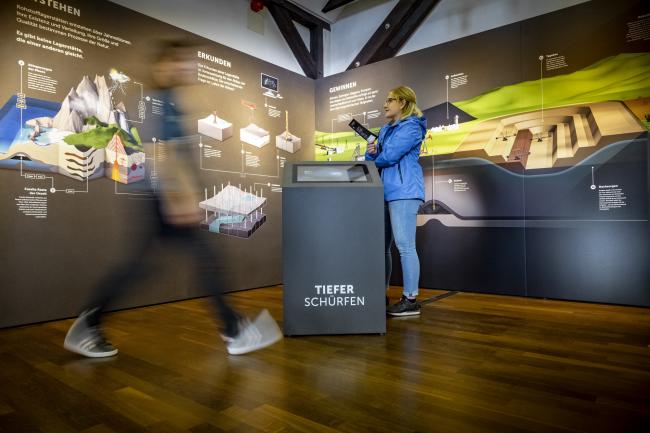Starting in the winter semester 2023/24, two fundamentally renewed, admission-free geo-studies programmes will be offered at TU Bergakademie Freiberg. Environmental Systems Science - Geoecology (Bachelor of Science) and Geoengineering (Diploma) provide students with practical and solution-oriented skills for current and future challenges of climate change and raw material and energy security. Language of instruction is German.
Both degree programmes offer practical knowledge and individual development opportunities, with their focus on the one hand being natural science-analytical (Environmental Systems Science) and on the other hand engineering-technical (Geoengineering). "Interdisciplinary competences are needed to face the changing climate conditions, to shape future land and resource use and at the same time to preserve biodiversity," explains Jun.-Prof. Conrad Jackisch, Dean of Studies for the Environmental Systems Sciences - Geoecology degree programme. "The new degree programmes provide a broad understanding of functions, processes and interactions in environmental systems and in the environmentally friendly use of the Earth's crust," adds Prof. Jörg Benndorf, Dean of Studies for the Geoengineering degree programme.
Prospective students with a general or subject-linked higher education entrance qualification for Germany or an equivalent qualification can apply until 30 September 2023.
With flexible and customisable study plans, the university ensures that students acquire both sound basic knowledge and in-depth knowledge in their field of interest. "Diverse specialisation options promote interest-led study that enables students to build up and expand skills and knowledge according to their personal interests. With small learning groups, readily available places in excursions as well as laboratory and professional internships, students at TU Bergakademie Freiberg are guided to successful completion," says Benndorf.
Bachelor's programme Environmental Systems Science - Geoecology
The new Bachelor's degree programme Environmental Systems Science - Geoecology is the perfect course for anyone interested in interrelationships in climate, biodiversity and the environment. "In the first semesters, students acquire a networked basic knowledge of the natural sciences, which they increasingly interweave and expand for interdisciplinary environmental systems analysis. With a broad analytical spectrum of methods, students delve deeper into individual sub-aspects of the human-environment system," explains Dean of Studies Jackisch. The degree programme can also be completed at the TU Freiberg as a part-time programme as well as temporarily at foreign partner universities. "The special feature of this degree programme is the simultaneous work in the laboratory, in nature and on the computer."
Through courses in environmental law, communication and technical English, students also acquire important soft skills for an international career. The programme concludes after 6 semesters with a Bachelor of Science degree. Graduates can then enter the profession directly or enrol for a further Master's programme.
Diploma programme in geoengineering
The diploma programme in geoengineering starts at the interface of geotechnics, geoenergy and mining: In 10 semesters, students are trained to become experts in the sustainable use of mineral and liquid raw materials. After the practice-oriented basic studies, they can choose one of four specialisations: They can choose between the specialisations "Geoenergy Systems", "Geomonitoring and Mine Surveying", "Geotechnics" or "Mining". "Graduates are able to evaluate and develop concepts for the use of the earth's crust. From the geoscientific basics to modelling and project management to the implementation and impact assessment of the use of the subsurface," says Dean of Studies Benndorf.
In an internship semester or as part of a thesis in cooperation with companies, students apply their knowledge and establish contacts in industry. Students interested in a career in research and development benefit from involvement in current research topics in the university's own research and teaching mine. In addition, at the TU Bergakademie Freiberg there is the possibility to contribute knowledge from your studies to the student mine rescue team as well as to complete an apprenticeship in mining or mine surveying in cooperation with the Saxon Upper Mining Authority. "Since raw materials play a central role for many new technologies for the energy and transport turnaround, there are numerous opportunities nationally and internationally for an exciting and meaningful professional activity," says Benndorf.

